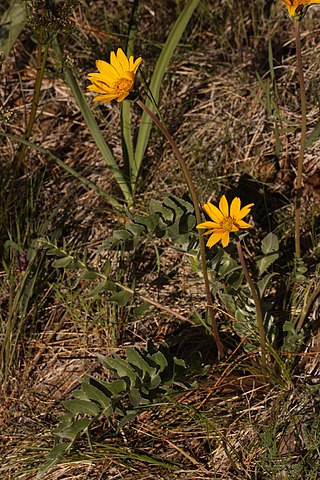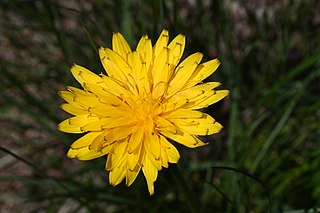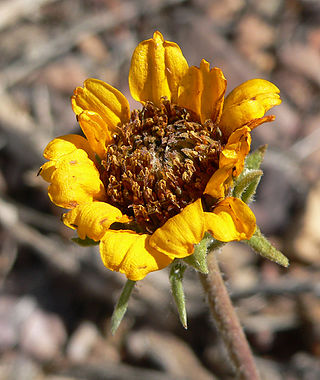
Balsamorhiza is a genus of plants in the family Asteraceae known commonly as balsamroots. These are perennials with fleshy taproots and caudices bearing erect stems and large, basal leaves. Atop the tall stems are showy yellow sunflower-like blooms. Balsamroots are native to western North America.

Gaillardia aristata is a North American species of flowering plant in the sunflower family, known by the common names common blanketflower and common gaillardia. This perennial wildflower is widespread across much of North America, from Yukon east to Québec and south as far as California, Arizona, Illinois, and Connecticut, although it may be naturalized rather than native in parts of that range. It is also naturalized in scattered locations in Europe, Australia, and South America.

Symphyotrichum chilense is a species of flowering plant in the family Asteraceae known by the common names Pacific aster and common California aster. It is native to the west coast of North America from British Columbia to Southern California and the Channel Islands. It grows in many habitats, especially along the coast and in the coastal mountain ranges. Despite its scientific name, it does not occur in Chile. Pacific aster blooms from June to October with violet ray florets surrounding yellow disk florets.

Ageratina herbacea is a North American species of flowering plants in the family Asteraceae known by the common names fragrant snakeroot and Apache snakeroot. It is native to desert regions of the southwestern United States and northern Mexico. It grows in rocky slopes in conifer forests and woodlands.

Symphyotrichum defoliatum is a species of flowering plant in the family Asteraceae known by the common name San Bernardino aster. It is endemic to Southern California where it grows in grasslands and meadows, and it is of conservation concern.

Symphyotrichum frondosum is a species of flowering plant in the family Asteraceae native to western North America. Commonly known as short-rayed alkali aster, it is an annual or perennial herbaceous plant that may reach 140 centimeters tall.

Balsamorhiza deltoidea is a species of flowering plant in the sunflower tribe of the plant family Asteraceae known by the common name deltoid balsamroot. It is native to western North America from British Columbia to California, where it grows in many types of generally mountainous habitat.

Balsamorhiza sagittata is a North American species of flowering plant in the tribe Heliantheae of the family Asteraceae known by the common name arrowleaf balsamroot. Also sometimes called Oregon sunflower, it is widespread across western Canada and much of the western United States.

Balsamorhiza sericea is a species of flowering plant in the tribe Heliantheae of the family Asteraceae known by the common name silky balsamroot. It is native to the Klamath Mountains of northwestern California and southwestern Oregon, with additional populations in the Blue and Steens Mountains in eastern Oregon. It grows in rocky areas, sometimes on serpentine soils.
Calycadenia oppositifolia is a species of flowering plant in the family Asteraceae known by the common name Butte County western rosinweed. It is native primarily to Butte County, California, although a few populations have been found in other parts of the state. It grows in the foothills of the high mountain ranges.

Enceliopsis covillei, known by the common name Panamint daisy, is a rare North American desert species of flowering plant in the family Asteraceae.

Erigeron petrophilus is a species of flowering plant in the family Asteraceae known by the common names rockloving erigeron or cliff fleabane. It is native to the mountain ranges of California from Siskiyou County south as far as San Luis Obispo County and El Dorado County. It also grows in southwestern Oregon.

Nothocalais alpestris is a species of flowering plant in the family Asteraceae known by the common name alpine lake false dandelion. It is native to the Cascade Range, Sierra Nevada and other mountains from northern Washington to central California, where it grows in subalpine forests and meadows, most commonly at 1,200–2,700 m (4,000–9,000 ft) elevation.

Palafoxia arida is a species of flowering plant in the aster family, known by the common names desert palafox and Spanish needle.

Quercus john-tuckeri is a North American species of oak known by the common name Tucker oak, or Tucker's oak. It is endemic to California, where it grows in the chaparral and oak woodlands of mountain slopes in the western Transverse Ranges, the southernmost Central Coast Ranges, and the margins of the Mojave Desert. The species is named after John M. Tucker, professor of botany (1947–1986) at the University of California at Davis, specialist in Quercus.

Quercus turbinella is a North American species of oak known by the common names shruboak, turbinella oak, shrub live oak, and gray oak. It is native to Arizona, California, New Mexico, Utah, Colorado, and Nevada in the western United States. It also occurs in northern Mexico.

Balsamorhiza hookeri is a North American species of perennial plant in the family Asteraceae. It grows in the Great Basin and neighboring regions in the Western United States. It is found in Washington, Oregon, California, Idaho, Nevada, Utah, and Arizona.

Balsamorhiza hispidula is a North American species of plants in the sunflower tribe within the aster family. It is native to western United States, primarily the Great Basin and other dry, relatively flat terrain. It has been found in Idaho, Montana, Wyoming, Oregon, Nevada, Colorado, Utah, and Arizona.

Balsamorhiza serrata is a North American species of plants in the tribe Heliantheae of the family Asteraceae.

Balsamorhiza lanata, with the common name lanate balsamroot, is a species of plant in the tribe Heliantheae of the family Asteraceae native to California.




















